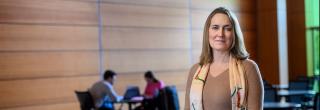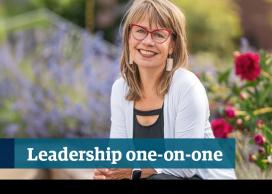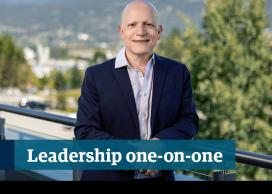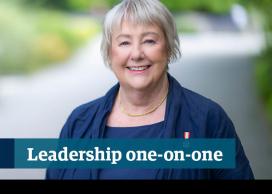Catherine Dauvergne is Dean of the Peter A. Allard School of Law. A life-long legal academic, she has worked in the areas of refugee, immigration, and citizenship law over the past quarter of a century.
As a UBC alumna, she clerked at the Supreme Court of Canada, and was named a Fellow of the Trudeau Foundation in recognition of her contributions to public discourse in Canada.
She was appointed Dean of the Peter A. Allard School of Law in 2015.
Q1. What quality do you most admire in a leader?
CD: Integrity. I also admire honest people whose word means something, and who share a belief in contributing to the greater good. In my experience, almost everybody who chooses to take a position in a law school is doing so because they have a belief in the work. People in this Faculty are smart, sharp, and at the top of their profession — they could be making more money as lawyers, yet they choose to be law professors because of their belief in influencing the young minds in our profession and contributing to a more just society.
Q2. What makes you laugh?
CD: My partner. There’s a lot of relentless seriousness in my work, and I would genuinely say that I’m not easily amused, but I’m married to a very funny man who makes me laugh every single day. It’s great!
Q3. Who inspires you, and why?
CD: One of the great things about this job is that I get to meet a range of people who, in my regular professorial life, I never would have come in contact with. Beverley McLachlin is a good example. She is a truly inspirational human being whom I think about from time to time when I’m in need of inspiration, and whom I would never have met personally, but for this role. She was a faculty member for a while, and served as the honorary chair of the Dean’s Advisory Council here. She is a jurist and author who served as the 17th Chief Justice of Canada from 2000 to 2017 — the first woman to hold that position.
Q4. For you, what makes UBC different?
CD: One of the things I really like about UBC is that it’s internationally engaged — it has been really deliberate and thoughtful about its international activity, and I admire that. It opens a huge number of possibilities both for what we, as a university, can do today and where we can go from here.
At a local level, our law school has an enormous commitment to training Indigenous lawyers, and this is something that has been in place for a very long time. So long, in fact, that it has almost ‘seeped into the woodwork’ and, therefore, it isn’t always well-known. As we move through the reconciliation journey, I’m often humbled by the importance of this commitment. We have the largest cohort of Indigenous law students in the country and we systematically work to ensure that this continues.
Q5. What is the most important lesson you’ve learned, in your career to date?
CD: Luck has played an enormous role in my career, and often plays a huge role for all of us in determining where we end up. I initially put off going to law school for many years, as I didn’t really know what I wanted out of it, or which direction I wanted my career to go — in fact, I came very close in not going to law school at all. I had been pursuing graduate work and working as a federal civil servant, so at that time, my career could have gone in several different directions. I feel like I fell into law very serendipitously, but seized the opportunity and realized that I loved it. As a result, I found a career with many wonderful pathways.
Q6. How do you like to recharge?
CD: Exercise plays an important role in my life. I walk, I spin, and I swim in a Masters Swim Club. I’m not a fabulous swimmer and the early mornings are tough, but I enjoy the challenge.
Q7. What is the best advice you were ever given?
CD: When I was in my 20s, someone encouraged me to have kids before I was 30. Even though my career was an important part of my life, I also understood that there was never going to be a rational time in my life or my career to have children. I followed this advice, had three children, and they really are the best thing in my life.
Q8. What do you value in your colleagues?
CD: Friendship, sincerity, and a chance to connect on a personal level. I was a faculty member for 13 years before I became the Dean and thanks to the friendships I had made during this time, I was able to work through the role shift successfully. It’s really important for me to get to know others in a meaningful way. People thrive and perform at the top of their game when they get to play to their strengths and work on projects they truly care about. I want to think about faculty and staff as people first, before getting to know them as roles on an organization chart.
Q9. What do you hope will be your lasting impact at UBC?
CD: I hope others will see that I’ve tried to do this job with a high degree of integrity and strive for transparency, openness, and fairness. I hope they see that I try to be deliberate and open about my decision making, and aim to be as accessible as I can when faculty and staff want to reach me. I’m conscious about the way that I inhabit this role and want others to see that it’s doable, it’s achievable, and it’s not a burden on my life outside of UBC. I strive for work-life balance and do my best to model the behaviour I hope to see in others.
Q10. If you could have a super power, what would it be?
CD: I’d like to be able to fly — that would be a true superpower!
Q11. What is your vision for the Allard School of Law for the next three years?
CD: This is an exciting time for us and a few interesting things come to mind. We’re at the beginning of implementing an experiential learning curriculum change which will complete its first cycle in three years’ time. We’re also designing post-graduation debt-relief which will soon come in effect — we’ll be the first law school in western Canada to do this. And within the next couple of years, we’re looking forward to celebrating our 75th anniversary as a law school.
Q12. In your opinion, what potential does the Allard School of Law still hold, and what is its potential impact on the legal system in both British Columbia and Canada as a whole?
CD: We have a very strong impact on the provincial legal system, as we are the largest law school in the province. Most of our graduates stay here and become the legal system in British Columbia — they become our lawyers and judges, our prosecutors and our NGO advocates. In this sense, law is relentlessly local, but our collective scholarly work is about changing the world.
One of the areas where this law school excels is in its commitments to social justice and its potential to contribute to a more just society. This contribution happens in an array of different ways, whether it’s improving access to justice, enabling focused faculty research, fairer securities regulation, feminist reform in the criminal law, and Indigenous rights — all of these pursuits have the potential to impact the legal system locally, nationally and internationally.
Published: May 1, 2019
Interviewed by: Rivka Parris, UBC Internal Communications



